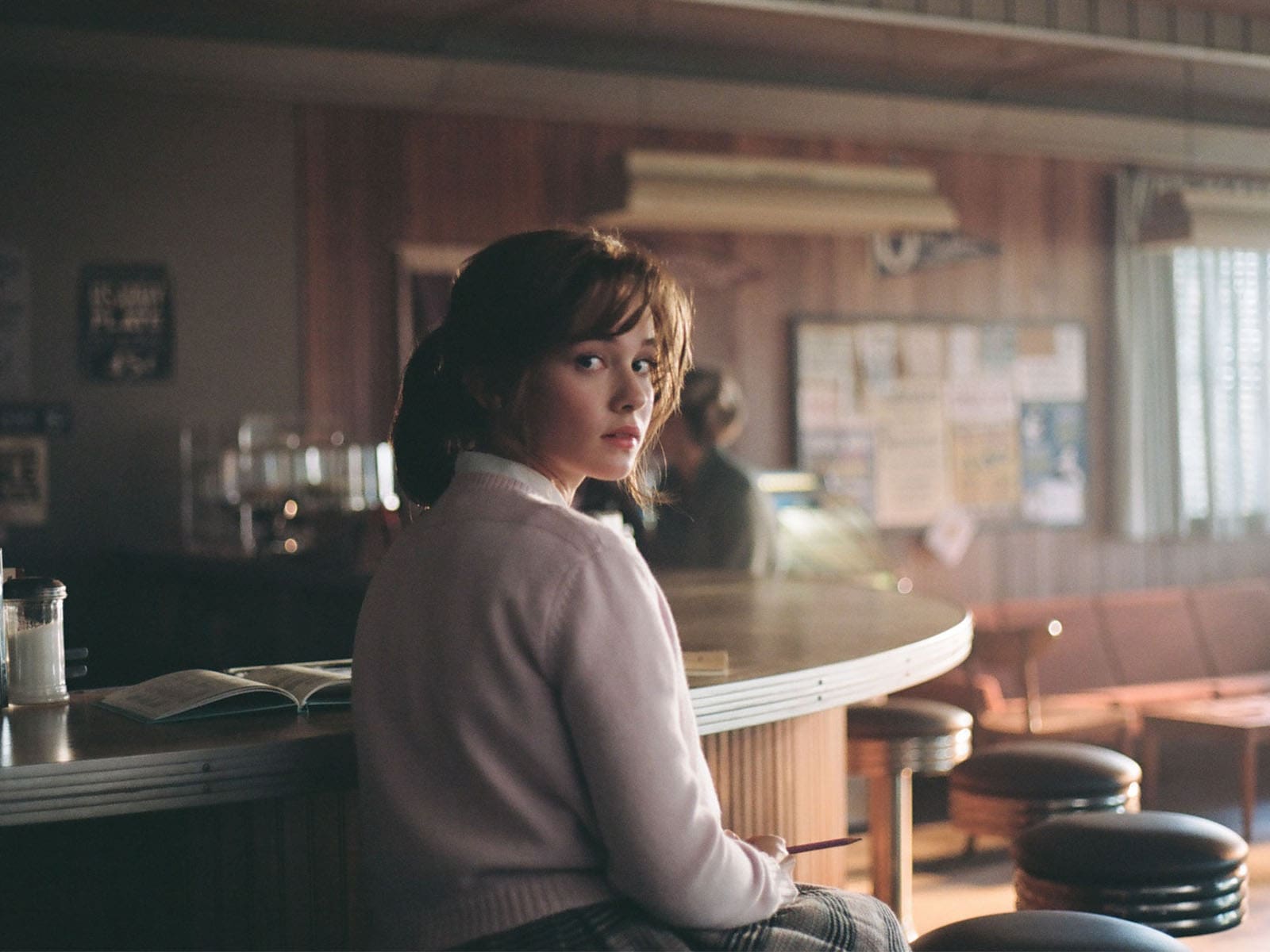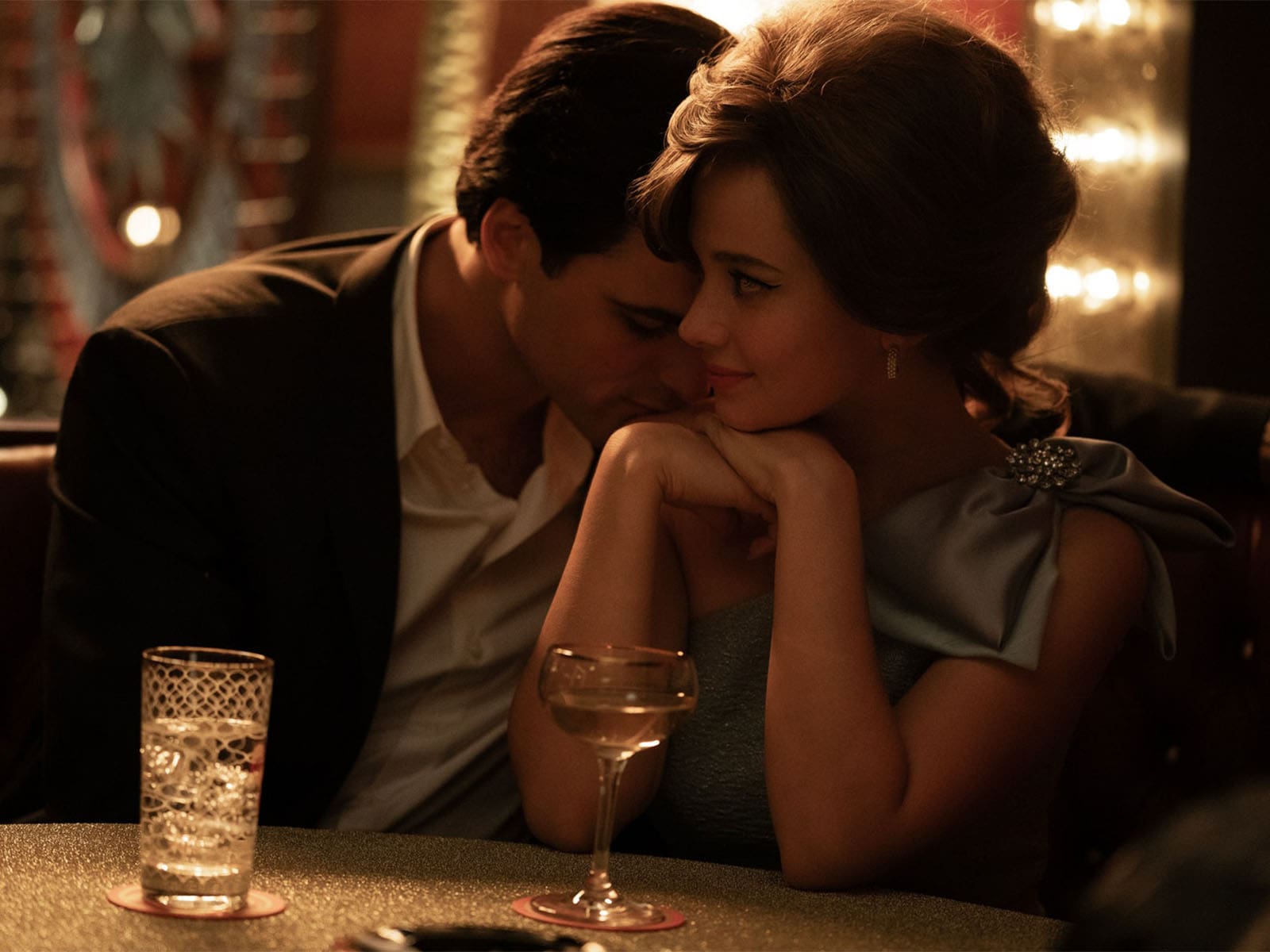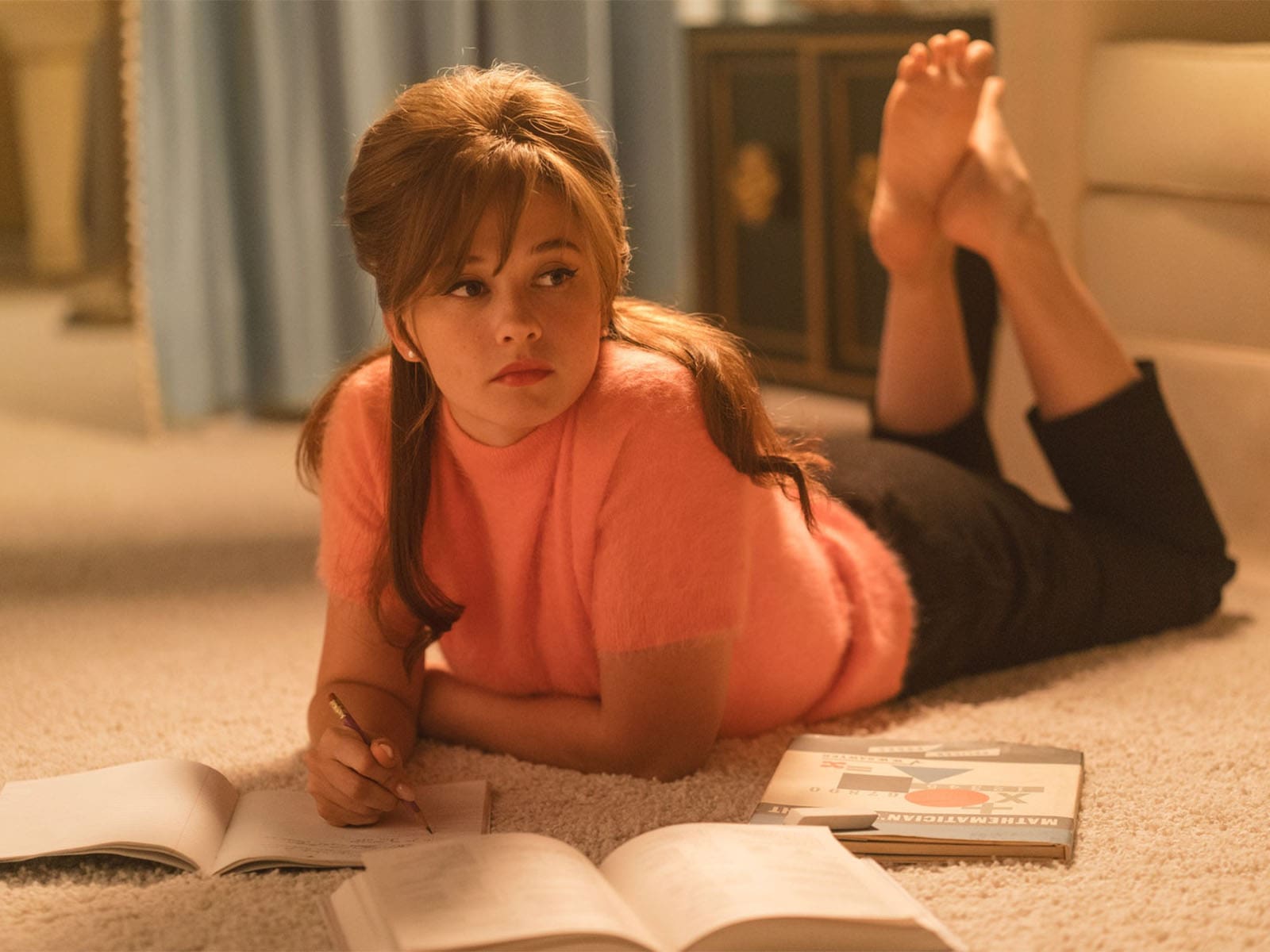Photo by Sabrina Lantos/A24
Photo by Sabrina Lantos/A24
There’s a lot to love in Sofia Coppola’s Priscilla. Much like the beloved auteur’s best films – the dreamy The Virgin Suicides, the neon-drenched Lost in Translation, the hedonistic Marie Antoinette, and the gloriously delicate Somewhere – her latest release, which just debuted at the Venice Film Festival, is a sensitive meditation on the secret lives of teenagers and young adults, their boredom and restlessness, and the minutiae that make up their daily existence. It’s a more-than-a-decade-spanning account of the life of Priscilla Presley, Elvis’s impeccably dressed, bouffanted bride of six years, and while it covers all the key milestones of their romance, it’s at its best when it zooms in further, examining the accoutrements of her childhood (miniature porcelain tea sets, rose-printed wallpaper, the army jacket Elvis gives her at the beginning of their courtship) and her not-quite-adulthood (cherry-red nail polish, lipsticks, a tiny bottle of Chanel No 5). In these sequences, as in much of this film, every shot is one you’d want to frame.
Thankfully, Priscilla’s age – the fact that she was just 14 when she met her future husband, then 24, while he was stationed in Germany in 1959 completing his military service – is not something Coppola brushes under the carpet. It’s clear when we first meet her (as embodied by the fresh-faced Cailee Spaeny), as she’s sitting at a diner counter and is suddenly approached by Terry West (Luke Humphrey), a friend of the king of rock and roll, who invites her to a party at the music legend’s house. There’s something vaguely sinister about the offer, but Priscilla, visibly disillusioned by her new life in Europe (a result of her stepfather, a US air force officer, being transferred to Wiesbaden from Texas) is intrigued. She convinces her parents and soon she’s meeting him in the flesh. Elvis (a dashing Jacob Elordi) asks if she’s a high school senior or junior, and she whispers in her high, angelic voice that she’s actually in ninth grade (the equivalent of Year 10 in the UK).

It explains the endearingly helpless way in which she falls head over heels for him, hungry for every expression of affection, quietly wary of his flings with other women, and utterly crushed by his return to the US. Following his departure, there’s a wonderful montage showing the years passing as Priscilla lies in wait, buying Elvis’s new records and following his escapades from afar. Then, out of the blue, he calls and invites her to Memphis, and that’s when this wide-eyed Alice in Wonderland truly goes down the rabbit hole. She and Elvis get closer, but don’t consummate their relationship; what he does do, however, is give her a pill to help her sleep – one that knocks her out for two days. But, Elvis doesn’t seem concerned and, once she wakes up, whisks her off on a glamorous trip to Vegas. Eventually, he persuades Priscilla’s parents to let her move to Graceland indefinitely.
Elordi is, undoubtedly, a less showy Elvis than Austin Butler, who shimmied his way to an Oscar nomination earlier this year – he’s gentler, more mumbly, seemingly more introverted and awkward in his movements – but the actor comes into his own once Elvis has complete control over his trophy-wife-to-be. At her new Memphis Catholic school, in which she’s enrolled by her parents to ensure she graduates, girls giggle about befriending her only to get access to her beau. She retreats from them and soon after, from the outside world itself, being told repeatedly by Elvis’s father and stepmother that she can no longer “make a public spectacle of herself”. The result is a creeping boredom that sees her walking delicately around her new home in pristine heels with nothing to do, bringing to mind Emma Corrin’s listless Princess Diana in season four of The Crown. (Now that’s another Sofia Coppola biopic I’d love to see.)

When Priscilla tells Elvis she’s thinking about taking some shifts at a local boutique for fun, he gently but firmly shuts it down. “It’s a career or me, baby,” he says simply, and she slowly begins to realise what she’s gotten herself into. She slips into a routine of classes, pill popping and endless waiting around, broken up by shopping expeditions initiated by Elvis – he makes her dye her hair black, put on more eye make-up and dictates what she wears (bright block colours, no prints and no brown, because it reminds him of the army). As time goes on, he becomes more mercurial: he throws a chair in a rage and then blames it on his “mama’s temper” which he claims to have inherited; and, when Priscilla confronts him about a love note from another woman, begins packing her bags for her, making it clear how quickly she could be thrown out. She weeps, and he holds her and takes it all back.
It’s coercive control wrapped up in a glittery pink bow, but the film is careful not to flatten the musical icon into a misogynistic caricature – he’s a man of his time who, in the wake of his mother’s passing, appears to be searching for a dutiful and undemanding partner who stays at home to “keep the fires burning”. It presents the (troubling and frequently terrifying) facts as they are – or at least how Priscilla herself recalled them in her 1985 memoir, Elvis and Me – and asks us to pass judgement. Elordi, in turn, sells us on his charisma and erraticism with aplomb. It’s worth adding that his height helps, too – at six-foot-four he towers over the tiny Spaeny and dominates her in every sense, nicknaming her “little one”.

Once Priscilla leaves school and grows more outspoken and strong-willed, Elvis laughs off her demands and complaints. He has affairs that he initially denies and admits to only after they’ve ended; and then proposes in the least romantic way imaginable, presenting Priscilla with a ring and telling her, “We’re going to be married”. It’s from this point onwards, though, that the film loses its footing slightly: their wedding flashes by in a breathless montage; Priscilla becomes pregnant; gives birth to their daughter, Lisa Marie; Elvis heads off on an extended tour; and soon, the pair are effectively living separate lives. Before we know it, Priscilla has ditched her cat-eye and let her hair fall into loose curls, embarking on a new chapter in Los Angeles where she learns karate, lunches with new friends and discovers who she is independent of her husband.
Coppola skips over Priscilla’s brief affair with her dance instructor during this period, one which she herself disclosed in her book, as well as her tryst with her karate teacher, Mike Stone. (The latter appears in the film, played by Evan Annisette, but nothing beyond a friendship is hinted at.) In her memoir, Priscilla went on to write that, after this point in their marriage, Elvis perceived a restlessness in her, requested to see her in his hotel room and “forcefully made love to me [saying] ‘This is how a real man makes love to his woman’”. (She later added that she regretted her own choice of words and had overplayed that incident.) In the film, Elvis does indeed request to see her and recites this line while kissing her passionately, but when she says no, he relents.
In the next scene, she decides to leave him, but with the omission of so many crucial details, her motivations feel a little muddled. Did the real Priscilla, who served as an executive producer on the film, want these portions of the story removed? Or did Coppola want to present her young heroine as someone pure who was wholly devoted to Elvis? Either way, I think an exploration of her other relationships and what drove her to them could have added greatly to our understanding of her needs and frustrations.
These sequences are also less effective because Spaeny seems somewhat out of her depth with the more dramatic material. Her outbursts don’t always ring true, and she’s occasionally underserved by lines that feel too on-the-nose. (“Am I losing you to another man?” Elvis asks her, and she replies, “You’re losing me to a life of my own.”) In the film’s quieter moments, however, she’s captivating: when she cheekily cheats on an exam; calls Elvis’s bluff when he asks for time apart while she’s pregnant (when she agrees, he immediately retracts his request); or calmly puts on a pair of fake eyelashes before being rushed to the hospital to give birth.
It’s those slower, more intimate portions of the story, when the film isn’t galloping through the biography of its protagonist, that give Priscilla its unique texture and make it a joy to watch. The film it most closely resembles from Coppola’s oeuvre is Marie Antoinette – both have raucous gambling montages, incredible costumes, shots of our leading lady walking down hallways as gossip and ridicule surround her and, most crucially, are centred on teenagers who were thrust into prominence and then left to their own devices – and it’s a worthy successor to that game-changing masterpiece, as well as being Coppola’s best film in over a decade. Just as Pablo Larraín, the director of Jackie and Spencer, is concluding his unofficial trilogy of beautiful and tragic public figures with an ode to Maria Callas as played by Angelina Jolie, let’s hope Coppola has another biopic about a complicated and much-mythologised woman up her sleeve – it’s sure to be as ravishing as this one.
This article was originally published on British Vogue.
